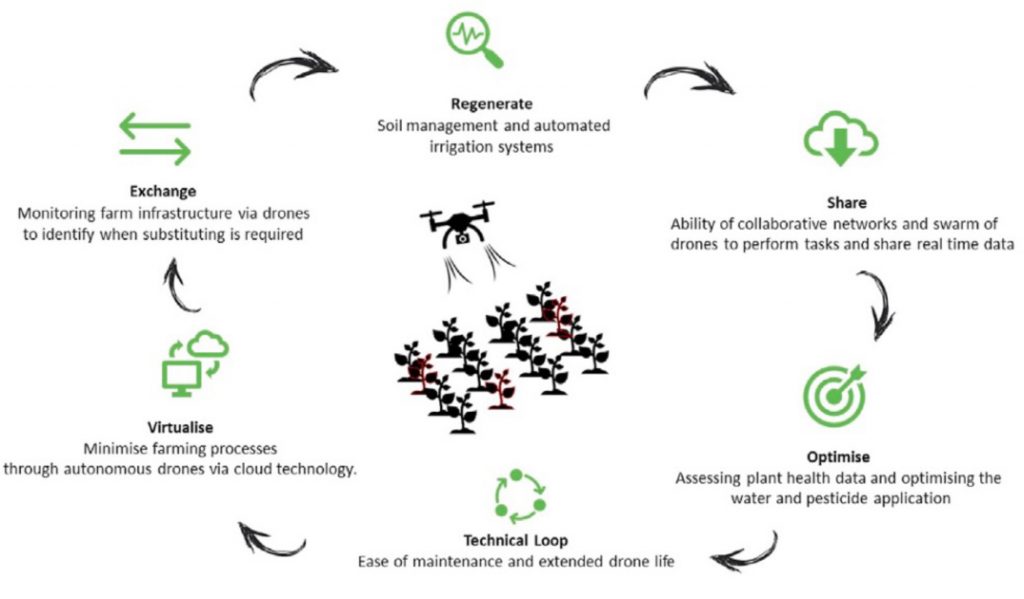How the use of pesticides exacerbates other barriers to cleaner agricultural production and why data-collecting AI drones offer a potential solution. Research from the UK’s University of Bradford School of Management
A changing agricultural business environment and the need to improve agricultural value chains, together with calls for more resource-efficient practices and sustainable approaches has meant that business and management research is just as vital for the agricultural sector as agronomic and other agricultural science-based research.
The pressing need to boost agricultural productivity
There is a pressing need for food producers, technologists, academics, and policymakers to identify innovative, effective, and sustainable approaches to boost agricultural productivity for the immediate future, for a sustainable food supply chain. With the global population expected to grow to 9.7 billion by 2050, pressure on food systems – and particularly on the agriculture sector – is increasing daily. Only a 70% increase in food production would be enough to feed this global population sufficiently. The Covid-19 pandemic has worsened the situation. A labour shortage caused by health concerns and lockdown measures, including the closure of international borders, has caused inevitable disruptions to both the production and movement of agriculture and food produce globally.
These conditions have led to inflation and this has made nutritious food, or even food itself, unaffordable to some people, causing hunger to more than 130 million people across the globe. This makes goal number two of the UN SDGs – to end hunger – all the more difficult to attain.
In some parts of the world, Covid-19 has also led to an increase of unethical agricultural practices, such as the overuse of chemicals in farming and suppression of labour, to meet growing demand in difficult times. Addressing this requires a detailed understanding of how innovative solutions can be incorporated into the agricultural supply chains, particularly within production, to achieve ethical, sustainable and socially viable food production.
Despite a host of state-of-the-art developments in agriculture, such as automation and smart farming, many challenges in the agricultural supply chain remain and there is still a lack of practical solutions.
Barriers to cleaner agricultural production
Our research explored key agricultural challenges and how industry 4.0 technologies, such as AI drones, may be the solution to these challenges.
What are the barriers that impact cleaner agricultural production? We identified a host of agricultural challenges which play a role in diminishing and disrupting agricultural yields. These include the following:
- Illegal deforestation
- Lack of efficient practices
- Lack of accurate predictions for seasonal output
- Theft and sabotage
- Inaccurate seeding methods
- Unproductive workers
- Pesticides application and hazards
- Workers health and safety risks
- Movement of produce within supply chain
- Pollution
- Poor soil conditions
- Plant disease
Existing research in this field has highlighted the intertwined nature of these challenges, so a fundamental element of our research was to see whether the identified challenges were interrelated. This revealed that ‘unproductive workers’ and ‘pesticides application and hazards’ contribute towards at least 10 further challenges in the context of Cleaner Agricultural Production (CAP), including the above-listed challenges of ‘pollution’, ‘lack of accurate predictions for seasonal output’, and ‘plant disease’ (i.e. spread of) as well as workers’ health and safety, a factor that subsequently affects the movement of agricultural produce in the food supply chain.
In other words, we found that in order to overcome challenges impeding the sustainability of food supply chain, while managing worker productivity, food producers and farmers must minimise the hazards resulting through pesticide application and exposure.
Unravelling agricultural challenges
For insights into how Industry 4.0 technologies can support clean and ethical agricultural production, we applied the the Ellen MacArthur Foundation’s ReSOLVE framework and its six actions of Regenerate, Share, Optimise, Loop, Virtualise and Exchange.
Based on this framework, our research suggests that AI drones may offer a number of opportunities to unravel agricultural challenges, provide sustainable solutions and promote ethically conscious agricultural practices by addressing the ‘farm structure’, ‘food security’ and ‘environmental impact’ concerns, as depicted in the figure below:

Source: Drones ReSOLVE framework application from a 2021 paper in the ‘Journal of Cleaner Production’, co-authored by this article’s authors.
AI drones in agriculture
Prior studies have highlighted how industry 4.0 technologies, such as AI drones, can help minimise plant disease rates, using drone sensors that enable early detection.
Drone sensors can also help optimise the use of pesticides, for their ability to apply a precise amount of the required pesticide to specifically selected plants. By providing real data which can inform any decision to apply pesticides to a targeted crop, the drone is not just useful for the reduction of waste and pollution and the optimisation of economies of scales with regards to pesticide use and application, but also for facilitating the production of a healthier food produce – which is, of course, a more ethical practice befitting the health and safety framework.
Furthermore, AI drones are able to capture valuable data, such as temperature, moistness of soil leaf, level of precipitation and wind speed – data which is essential in keeping track of plant health and giving an indication of the amount of marketable produce.
The possibilities presented by AI-driven drones in capturing vast quantities of field data, in detecting diseases and in monitoring crops simply cannot be ignored, especially given the role of pesticide application in other barriers to the movement of cleaner agricultural production within the supply chain.
Because excessive pesticide hazards have an adverse impact on cleaner agricultural production, as well as on the movement of goods within the supply chain, it is vital for both agricultural producers and policymakers to explore ways to minimise their use and exposure. Equally, it is imperative that farmers and operational agricultural workers are aware of the underlying and interrelated role of excessive pesticide hazards in barriers afflicting the agricultural supply chain.

Dr Kamran Mahroof (left) is an Assistant Professor in Supply Chain Analytics and Programme Leader for the MSc in Applied Artificial Intelligence and Data Analytics at the School of Management, University of Bradford, UK.
Dr Amizan Omar (right) is an Associate Professor in Strategic Management at the School of Management, University of Bradford, UK.




